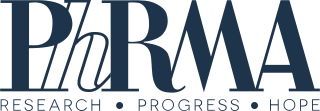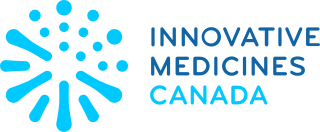Related Research Articles

Pharmaceutical Research and Manufacturers of America, formerly known as the Pharmaceutical Manufacturers Association, is a trade group representing companies in the pharmaceutical industry in the United States. Founded in 1958, PhRMA lobbies on behalf of pharmaceutical companies. PhRMA is headquartered in Washington, D.C.

The Merck Group, branded and commonly known as Merck, is a German multinational science and technology company headquartered in Darmstadt, with about 60,000 employees and a presence in 66 countries. The group includes around 250 companies; the main company is Merck KGaA in Germany. The company is divided into three business lines: Healthcare, Life Sciences and Electronics. Merck was founded in 1668 and is the world's oldest operating chemical and pharmaceutical company, as well as one of the largest pharmaceutical companies globally.
Sanofi S.A. is a French multinational pharmaceutical and healthcare company headquartered in Paris, France. The corporation was established in 1973 and merged with Synthélabo in 1999 to form Sanofi-Synthélabo. In 2004, Sanofi-Synthélabo merged with Aventis and renamed to Sanofi-Aventis, which were each the product of several previous mergers. It changed its name back to Sanofi in May 2011. The company is a component of the Euro Stoxx 50 stock market index. In 2023, the company’s seat in Forbes Global 2000 was 89.
Edel SE & Co. KGaA is a German independent media company based in Hamburg. As a label and publishing group, it also operates marketing and sales for artists and smaller music labels. The repertoire of the Edel labels includes dance, rock and pop music to classical music and a children's catalogue. In addition to the development and marketing of music, the group also deals with the production, logistics and distribution of CDs, DVDs, vinyl records, and books at the production site of the subsidiary optimal media GmbH in Röbel/Müritz as well as with services in the online and book business.

Grünenthal is a pharmaceutical company headquartered in Aachen in Germany. It was founded in 1946 as Chemie Grünenthal and has been continuously family-owned. The company was the first to introduce penicillin into the German market in the postwar period, after the Allied Control Council lifted its ban.

Schering AG was a research-centered German multinational pharmaceutical company headquartered in Wedding, Berlin, which operated as an independent company from 1851 to 2006. In 2006, it was bought by Bayer AG and merged to form the Bayer subsidiary Bayer Schering Pharma AG, which was renamed Bayer HealthCare Pharmaceuticals in 2011. Schering was listed on the Frankfurt Stock Exchange and had 26,000 employees as of 2004.

Genome Valley is an Indian high-technology business district spread across 2,000-acre (8.1 km2)/(3.1 sq mi) in Hyderabad, India. It is located across the suburbs, Turakapally, Shamirpet, Medchal, Uppal, Patancheru, Jeedimetla, Gachibowli and Keesara. The Genome Valley has developed as a cluster for Biomedical research, training and manufacturing. Genome Valley is now into its Phase III, which is about 11 kms from the Phase I and II with the total area approximately 2,000-acre (8.1 km2).
The pharmaceutical industry in Pakistan was estimated to be worth Rs. 748 billion (US$2.6 billion) in 2023, representing about 1% of the country's GDP. The industry is largely import-dependent, with more than 90% of raw material being imported and only 12% of APIs locally produced. Pakistani pharmaceutical companies are engaged in importing raw materials, compounding APIs with excipients, coating of pills, and fill-finish activities. The industry is regulated by the Drug Regulatory Authority of Pakistan, which oversees drug approvals and pricing.
Alnylam Pharmaceuticals, Inc. is an American biopharmaceutical company focused on the discovery, development and commercialization of RNA interference (RNAi) therapeutics for genetically defined diseases. The company was founded in 2002 and is headquartered in Cambridge, Massachusetts. In 2016, Forbes included the company on its "100 Most Innovative Growth Companies" list.

August Faller GmbH & Co. KG is a German manufacturer and system supplier of pharmaceutical secondary packaging headquartered in Waldkirch, in Baden-Württemberg. With 1147 employees in 6 different locations across Europe, the company produces 2.1 billion folding cartons, 1.6 billion leaflets and 1 billion adhesive labels per year. August Faller GmbH & CO. KG is one of the market leading companies in the field of pharmaceutical secondary packaging in the German-Speaking region.

The Pharma Documentation Ring (P-D-R), founded in 1958, is a think tank of information and knowledge-management professionals representing major research-based pharmaceutical companies. The association has four aims:

Stefan Oschmann is a German businessman. He was the CEO of pharma group Merck.
The Bundesverband der Pharmazeutischen Industrie (BPI), founded after WWII with headquarters in Berlin, is a German Non-profit association and trade group for Small and medium-sized enterprises in the pharmaceutical industry. As of 2022 it represented 240 classic pharmaceutical companies, pharmaceutical service providers, biotech companies, herbal medicines and homeopathy/anthroposophy with altogether approximately 78,000 employees. BPI´s focus has been on political consulting and public relations on the EU-level in order to enhance development in the national and international health care systems.
Hagen Pfundner is a German pharmacist and industrial manager. He is a member of the Board of the Bundesverband der Deutschen Industrie (BDI), the Foundation of German Industries) and the Verband Forschender Arzneimittelhersteller, as well as being an honorary professor of Freiburg University and chairman of the University Council of the DHBW Lörrach.
The Federation of German Industries is the umbrella organization of German industry and industry-related service providers in the legal form of a registered association. It represents 39 industry associations and more than 100,000 companies that employ around 8 million workers. Membership is voluntary. A total of 15 Bundesland-level agencies represent the interests of the economy at regional level. The headquarters of the BDI is the Haus der Deutschen Wirtschaft in Berlin. The BDI also has offices abroad and is represented internationally. Siegfried Russwurm has been its President since 1 January 2021. BDI has offices in Germany and abroad. A total of 15 state representatives represents the interests of the economy at the regional level.

Cheplapharm Arzneimittel GmbH, headquartered in Greifswald, is a German pharmaceutical company that markets branded drugs, medical products, supplements and cosmetics.

Innovative Medicines Canada (IMC) is a national association of pharmaceutical companies that represents the interests of the research-based pharmaceutical industry in Canada. Its membership includes biopharmaceutical companies, vaccine developers, and manufacturers of medical devices, and works with government agencies, insurance companies, healthcare professionals and other stakeholders in the regulation and promotion of medicines.
References
- ↑ "BPI Mitgliedschaft" . Retrieved 2013-11-07.
- 1 2 3 4 member companies vfa, 5 July 2017
- ↑ Bundesverband der Arzneimittelhersteller German Medicines Manufacturers' Association, in English, accessed 4 July 2017
- ↑ Verband der Generika- und Biosimilarunternehmen-Grundsätze und Ziele Pro Generika, retrieved 5 July 2017
- ↑ Deutscher Generikaverband wird aufgelöst 22.11.2012, Deutsche Apotheker Zeitung (German)
- 1 2 3 "Statistics 2015 - The Pharmaceutical Industry in Germany" vfa, 28pp
- ↑ Transparenzkodex: Die zweite Veröffentlichungsrunde läuft! vfa, 20 June 2017
- ↑ Christina Elmer, Markus Grill und Stefan Wehrmeyer.Vielen Dank für die Millionen! 14 July 2016, Der Spiegel.
- ↑ DESTATIS Federal Statistical Office retrieved 5 July 2017
- ↑ "Tabelle: Die mächtigsten deutschen Lobbyorganisationen im Überblick". manager magazin (in German). 2010-07-19. Retrieved 2017-06-21.